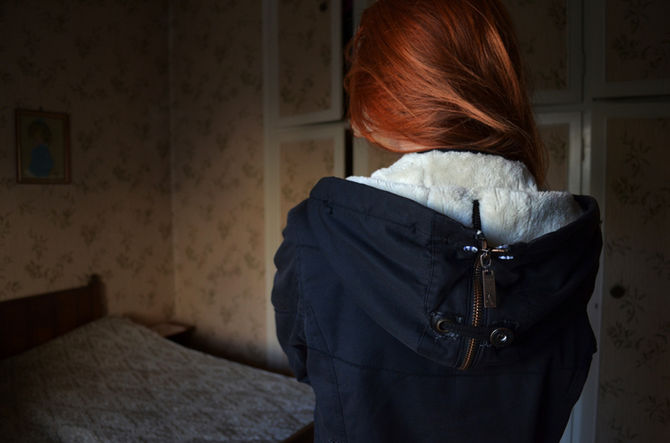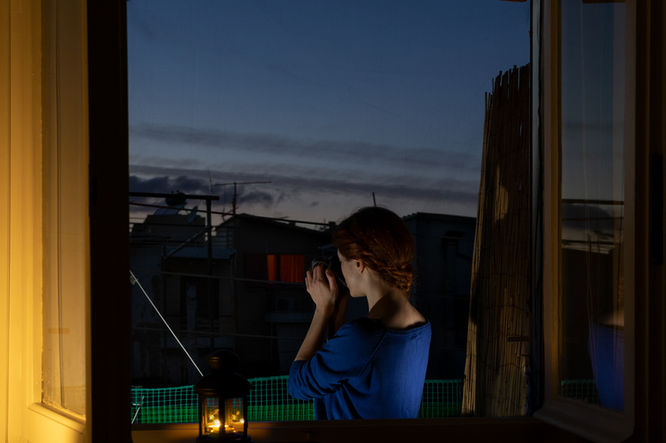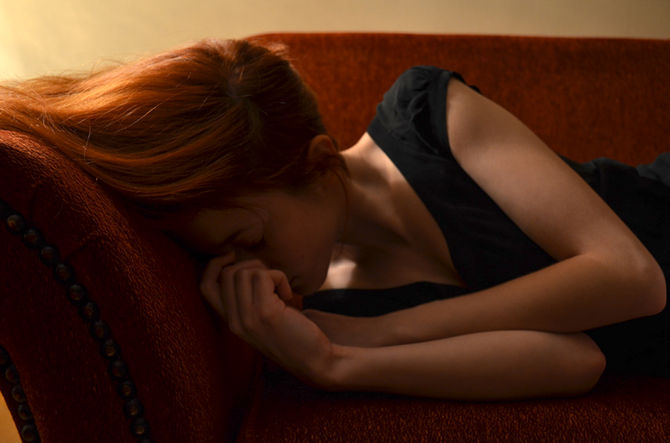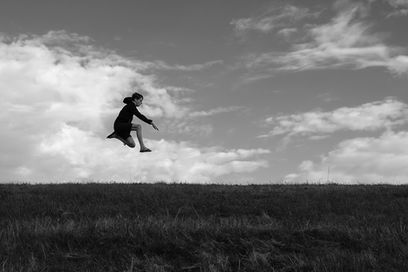
INTERVIEW
April 5, 2021
INNER TRUTHS
Photography by Nicole Tsatsou
Interview by Melanie Meggs
Greek photographer Nicole Tsatsou harnesses the power of the lens to explore an inner search around her self-image, trying to set questions about the relationship between photography and reality. Not only around the interpretation of the image, but also the human need to capture and preserve the visible.
Nicole is concerned with issues of identity and roles, and explores the relationship between the photographer and the subject, and consequently between the artist and their model. She studies how they influence each other and how this can be portrayed through narrative photography and self-portraits. Her photographs depict everyday situations that are not real events, but rather inspired by everyday life and reconstructed in order to create a delusion of reality to the viewers.
Nicole Tsatsou’s works pose interesting questions about the truth behind photographs, and how our need to immortalize ourselves leads us to create our own realities. Join us as we dive into the mind of this talented artist, to discover how her images explore the concept of identity and self-image, and how her unique perspective forces us to reconsider our own perception of reality.

“Through my images I attempt an inner search around the self-image, and I try to set questions about the relationship between photography and reality, the interpretation of the image, and also the way that narrative photography and self portraits can function as proof of a person’s own reality. In my work I am concerned with issues of identity and roles. I explore the relationship between the photographer and the person being photographed and I study the way they influence each other, something that is of particular interest in self portraits.
The scenes are inspired by everyday life and reconstructed in order to create a delusion of reality to the viewers. Presenting a voyeuristic atmosphere, my photographs are self portraits, supposedly talking about my life, but the viewers don’t actually witness real events, but rather see whatever I allow them to see as the photographer – creator of the scene. After all, are photographs supposed to show us the truth?”
IN CONVERSATION WITH NICOLE TSATSOU
THE PICTORIAL LIST: Nicole please tell us about yourself and your background. What started your interest in photography for it to become an important part of your life?
NICOLE TSATSOU: I was born and raised in Athens, Greece in 1994. As a kid I was intrigued by the process of taking pictures and capturing whatever grabbed my attention, even though I had really no idea what I was doing or how I should do it. I remember my parents buying me several single-use cameras, and at the age of 10 my aunt gave me my first polaroid (which I still use). It wasn’t until I was 17 that I took it more seriously and decided that photography was what I wanted to do for life. I got my bachelor’s degree in Photography and Audiovisual Arts, and I am currently enrolled in Athens School of Fine Arts’ Master studies in Digital Arts.
TPL: Where do you find inspiration to photograph?
NT: I have always believed that it’s quite hard for you to find inspiration, and instead it’s the inspiration that finds you! For me, quite often this happens when I go to bed or the moment I wake up. Or while I cook! In other words, in my experience inspiration hits you when you least expect it, and not when you desperately try to come up with ideas. However, the important thing here is to have influences and always try to expand your interests, because they have a huge impact on your work.
I love arts, so I constantly try to learn new things by doing research on anything I like. For example, since colour plays a vital role in my photographs, I read books about painters and I research their work. Sculpture and dancing help me understand the human figure and body posture. Films and cinematography help me with the lighting setup. Literature and poems influence my narrative and music affects my mood. I combine influences from my various interests and all these come together in my final images. For me, photography is all about the research and work I do prior to hitting the click button.
TPL: When you take photographs, do you usually have a concept in mind of what you want to shoot, or do you let the images just 'come to you', or is it both? Describe your process?
NT: In my work I follow a kind of a ritual, mainly in terms of the research and the choices I make. This includes the semiology in my pictures, the identity that I will choose to present, the means that I will use, but also what I will choose to present to the viewer.
Most of the times I already have a concept in mind, sometimes I even make sketches of the image that I want to take. I make notes underneath the sketch, something like a mood board. Then I set the camera on the tripod and set the place by removing or adding objects and rearranging the furniture. Then I set the lighting and start testing. Because I take self portraits I constantly have to go back and forth, behind the camera to check the photo and then back in front of it again to pose.
On the contrary, I almost never do the process I just mentioned when I use one of my Polaroids. I may have a concept in mind, but I want these images to be more spontaneous. For example, I may wait for a specific time of the day to take the picture, so that a specific shadow will be at the right place, but when that moment comes I improvise.
TPL: Do you have any favourite artists or photographers you would like to share with us, and the reason for their significance?
NT: I have many favourite artists whose work I admire, but I’m only going to name a few who’ve had the most impact on my work in various ways. First things first, I love Edward Hopper! Other painters that have influenced me are Edgar Degas, Egon Schiele, Edvard Munch, Caravaggio and Yiannis Moralis. My favourite photographers are numerous, but to name only a few we have Cindy Sherman, Gregory Crewdson, Julia Fullerton Batten, Anni Leppala, Elina Brotherus, Hannah Starkey, Philip-Lorca diCorcia, William Eggleston, Steven Shore, and the list won’t stop... Oh, and I also love the work of Bill Viola, Chantal Akerman, Lucas Samaras and Jannis Psychopedis.
In my photographs I depict myself in everyday situations, however they are not real events.

TPL: Does the equipment you use help you in achieving your vision in your photography? What camera do you use? Do you have a preferred lens/focal length?
NT: I use a full frame mirrorless camera and I’m very happy with it, it really helps with the low key images. I prefer wide angle and normal focal lengths, though I usually shoot at 50mm. I also use a Polaroid sx70, as well as a Polaroid 600 for the images that seem to be more in the heat of the moment.
TPL: What are some of your goals as an artist or photographer? Where do you hope to see yourself in five years?
NT: I focus quite a lot on my academic education, so I want to receive my Master’s degree and then hopefully continue on for a PhD. On a more practical level, I would like to experiment with larger sets and different places.
TPL: Are there any special projects you are currently working on that you would like to let everyone know about?
NT: I am currently working on some video self portraits. By adding the element of time and sound, myself portraits change completely. The narrative changes entirely, and so does the procedure. My main influences on this work are Chantal Akerman, Sam Taylor Wood and Gustav Deutsch.
TPL: When I am not out photographing, I (like to)…
NT: Go to the movie theater, go to concerts, visit art exhibitions, read books, play the guitar, go for long walks, travel.

Nicole Tsatsou's work serves an important reminder that photography is about more than just capturing a moment. It can be used to explore deeper questions about our identity, our relationship to the world around us, and our need to create our own versions of reality. We should use the lens to search within ourselves, and to remember that the power of photography lies in its ability to tell stories, provoke thought, and inspire further understanding. As such, we should all strive to use the power of photography to explore our innermost thoughts and feelings. Connect with Nicole to view more of her inspirational photography.







































